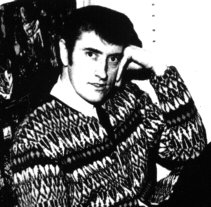|
|
||||
|
Articles & Features Joe Speaks! A small collection of contemporary news interviews and articles in which Joe has a chance to speak for himself for once The Death of Joe Meek A gathering together of all available facts (few) and myths (many) about the supposedly mysterious circumstances surrounding the death of Joe Meek and his landlady, Violet Shenton An RGM Photo Gallery A private collection of photos taken over the last ten years of RGM people, places and things RGM Royalty Statement Just to prove that RGM artists do occasionally get paid, a recent royalty statement from publisher Campbell Connelly sent to Dave Adams detailing sales and earnings on some of the CD re-issues |
Just For Fun: The Joe Meek Drinking Game Great fun for Christmas, New Year, birthdays, well, any time you don't have to drive really. Joe Meek Desktop Theme Wallpapers, screensaver, sounds, cursors, icons and Dave Adams with his finger up his nose. Includes separate component downloads for those without the all-singing all-dancing Themes software Photo Quiz Sorry, no prizes for getting them right, I already know who they are
|
|||
|
Obituaries: Heinz Burt - Geoff Goddard - Kim Roberts |
||||
|
You have, by some means or other, arrived at Meeksville, an online repository for a miscellany pertaining to the life and work of legendary British record producer Joe Meek. Best known for his international smash hits Telstar by the Tornados and Have I The Right by the Honeycombs, Meek's eccentric style and independent status set him apart from the other industry moguls of the time; not only producing but also writing, arranging, engineering, promoting and leasing his artists. For Joe Meek, the sound was all-important; a few poor lyrics here and there, or a ropey singer, really weren't an issue. Less musically inclined people, able to only hear what they hear with their ears, have accused him of being behind the times; but we have to listen beyond the songs themselves to understand his genius.It has been said that Joe Meek was to music what Ed Wood was to film-making; a more apt comparison would be with the method of Alfred Hitchcock. Able to hear the finished product in his head as Hitchcock was able to see the entire movie, the step from conception to completion was a hard one. Hampered by primitive equipment - the gear he needed to realize some of his projects simply did not exist in the 1960's, and in some cases is only just coming into use now - he was often frustrated in his efforts, and laughed at when all around him were too short sighted to see where he might be headed. In 1961 he was largely ignored when he put forward his suggestion for a needle-less gramophone; and we all think the Beatles had some revolutionary ideas with Sergeant Pepper. |
||||
|
Got mail? Email webmaster at [email protected] |
||||
|
Free counters provided by Honesty.com. |
||||
 ...............
............... ...............
...............